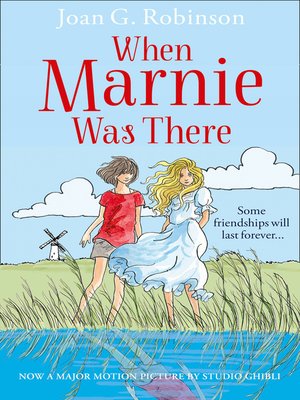
She had been nearly drowned, but nobody should know. Nobody had ever known anything that was important to her.

She had been nearly drowned, but nobody should know. Nobody had ever known anything that was important to her.

I own two copies of Joan G. Robinson’s When Marnie Was There. A 1972 paperback by Collins, and a 2014 paperback by HarperCollins. I had first read Marnie from said 2014 edition I borrowed from the library, which I of course fell in love with. I think most people, coming from the Hiromasa Yonebayashi film at least, are best familiar with this edition. After all, this edition was to meet popular demand for the book at the time the film was released, reviving it from out-of-print. Indeed, there was a small period before the film came out where copies become algorithically listed for hundreds of dollars online, the last scarcely available copies being the 2002 edition or earlier.
So I really like the 2014 edition. The front cover illustration, as I’ve said
before is very fresh cover art, and throughout it contains illustrations by
Peggy Fortnum. Mind you though, it physically comes with a small circular
sticker on the front cover that reads, Now a major motion picture by Studio
Ghibli,
and pictured in the center is Anna and Marnie from the film. A tad
obnoxious, no. Ha ha, you’re only reading this cause you saw the movie.
When it come to buying my own copy, I chose a 1972 paperback edition I found on eBay. It’s delightfully compact, lightweight, I found the cover photography very pretty, and the typesetting to be excellent.
1972 is just the year of the edition. My copy is actually the sixth print; its physical print date was 1979. Six reprints in six years is really good! Perhaps it was on the verge of becoming an outright classic or good. Recommended retail prices printed on the back of my copy indicate that it was being sold internationally too. The UK price is 70 pence. It was probably sold in chemists, offered as something for children to spend their pocket money on.
I first noticed something was different about this edition when someone on /u/ quoted a passage from chapter 16,
Dear Anna. I love you more than any girl I’ve ever known. She wiped the tear away and said, suddenly merry again
In response to me quoting the original version of that passage, which had
gay
instead of merry.
I eventually was motivated to comb through each edition. I evaluated chapter-by-chapter, starting from the last and working backwards. Yes, I can say I read this book front and back.
I began to note what I call global changes, changes that are made passim.
hallobecomes
hello. For example,
Hallo, Sandra!becomes
Hello, Sandra!. I thought this might have been one or two places at first, where Robinson is evoking the dialect of the locals. But not only does she spell it that way in every instance in this book, but it looks to be every book she has written?
Raymond was home at the week-endbecomes
weekend(who is Raymond, anyway?) I’ve listed hyphen removals of some specific words.
Mr.and
Mrs., are now
Mrand
Mrs, no full-stop. So of course,
Mrs. Prestonis now
Mrs Preston. Not consequential.
Here comes the crux of the investigation. So chapter 3 retains the only gay in the 2014 edition, "gay life of Bournemouth". Of course to mean in the old-timey sense, happy, fabulous, etc. So particular use of that word is fine here, but the other contexts describing certain characters—Anna and Marnie no less—that’s where caution is taken? Who are of course gay in both senses of the word. I wonder if caution have been taken if Robinson said Brighton instead of Bournemouth…
Aside from removal of gay, I want to hone in on the one other change made that
specifically applies to the Dear Anna,
sentence, the removal of the
repeated I love you
. Was it just getting too fruity for the editors to
handle, or is this just an innocent mistake in transcribing the source
material. If it’s a mistake, it’s the only mistake of its kind. I doubt it.
I’m kind of proud of noticing this one. So earlier this year, when the King
here in the UK was coronated, during the ceremony when Welby was reciting bunch
of bible stuff I heard that turn-of-phrase, Hold fast that which is
Good
. Comes from the Book of Common Prayer, I think, in the Anglican
church.
This phrase is fairly important in the story. It is what the sampler on the
Anna’s bedroom wall reads, with a picture of an anchor. It at first intimidates
her, Anna didn’t feel good,
then almost haunts her when it comes to the
windmill chapter, like the words of a nursery rhyme learned long ago
in
her desperation to hold fast (tight) onto something. It didn’t occur
to me the word fast
was used like that until I considered words like
fastening
when referring to belts and screws and such.
So in the first instance this phrase is referenced, the G
in Good
is uppercase. I suspect this is because it is also meant to be a divine noun,
rather than just an adjective, analagous to the divine pronoun Him
when
referring to God. Good as in God. Perhaps I’m overthinking such a tiny
typographical detail, but it’s possible that is something that was lost.
Remember that Robinson authored a some Christian literature in the past, but
also Christian references appear in Charley as well.
Two words that were changed. Sandra was fair and stoild
becomes
Sandra was fair and solid
. That has to be plain wrong, it’s not usual to
describe someone as solid
no matter how much of a fat pig they are.
Mr. Lindsay retired behind a newspaper
, there’s no real reason to have
changed that to returned
?
This brings me to quite a whole other thing, there are Peggy Fortnum drawings
that do not appear in the 2014 edition, like the one I thus carefully scanned
and cleaned up and using at the top of this html document: Anna, laid down on
the sofa after being rescued by Wuntermenny/Toichi, just as if the poor
little lass were a cod fish.
It’s very beautiful and haunting. I really liked this part of the story, how
the mood changes with one sentence soon thereafter, Anna was ill for a long
time
. Several days just quietly summarised in a few words. There’s
something strange and quiet about the illustration here too. Why was it
removed. Maybe it was too scary looking.
| ChapterCh. | Original | Change |
|---|---|---|
| 2 | white-washed | white-washed to whitewashed |
| over-full | over-full to overfull | |
| Poor little-old thing | Hyphed added to little-old thing | |
| 5 | Sandra was fair and stolid | stolid to solid |
| 6 | ’Yes, well - maybe—’ said Mrs. Pegg | Emdash changed to elipses |
| Then from far across the marsh came the mad, scarey, scatter-brained cry of a peewit, | scarey to scary; typo fix | |
| 11 | She gave a little shudder, then in an instant became gay again | gay changed to merry |
| 14 | But even as she sat there, dreaming about it, the music faded, the gay grown-ups in their gold-braided uniforms | gay changed to merry |
| 16 | Dear Anna, I love you. I love you more than any girl I’ve ever known. She wiped the tear away and said, suddenly gay again | I love you removed; gay changed to merry |
| 17 | Marnie told her, skipping about on the sand in an exaggerated way as if the show how gay and free she was | gay change to happy |
| You’ve no idea how kind my parents are! | Italics removed on idea | |
| Sometimes she winds my hair round and round, so it makes tangles | Italics removed on makes | |
| Anna! Please, let’s make our garden | Italics removed on Please | |
| the quiet, secret side, that seemed to recognize her | recognize to recognise | |
| 18 | But she began to realize that she must not rely on Marnie too much. That if she was over sure of meeting her | realize to realise; hyphen added in over sure, to over-sure |
| ’I’ll tell you another secret,’ she said seriously. ’I don’t want to grow up. Not ever | Italics removed on I don’t want to grow up | |
| You don’t keep telling me what I ought to do | Italics removed on ought | |
| They’ll take you away and shut you up in the windmill with only the wind ’owling and then you’ll be sorry | Italics removed on then | |
| 19 | The water in the creek had been churned up into little choppy, grey-green waves, and Anna had realized that even if the tide were right | realized changed to realised |
| If only there were something told hold onto, she thought, to hold fast - and the words ’hold fast that which is Good’ | Good changed to good | |
| 23 | She herself had imagined them in the beginning, before she had even met Marnie, and no one had ever seen them | Hyphen added to no one |
| 25 | Anna was looking at a water-colour hanging on the wall at the foot of the stairs. | Hyphen removed in water-colour |
| 26 | as if she was in a contented day-dream | Hyphen removed in day-dream |
| 28 | While she was reading the book she had remembered something | Italics removed on had |
| 29 | Mr. Lindsay retired behind the newspaper | retired changed to returned |
| 30 | Mrs. Lindsay had finished the spare room curtains this morning, just before the letter came | Hyphen added in spare room, to spare-room |
| 32 | the fact is, the council send us a cheque every fortnight to help with your expenses. It is only a contribution, you understand, and it’s quite a normal procedure. | Italics removed on is |
| 33 | And Pluto. Yes, that was the name of that dreadful dog! Perhaps he wasn’t so fierce really... But Marnie was afraid of him, too - fancy that, she never told me—! | fancy changed to Fancy, uppercase F |
| 34 | Marnie’s mother was away a lot. She was young, and gay, and pretty, and she entertained a great deal at their house in London. | gay changed to merry |
| 37 | (Scilla, and even Andrew, felt outside sometimes; she knew that now) | Parenthesis changed to emdash |
| In two days time she and the Lindays would be going home too | Add apostrophe after days |